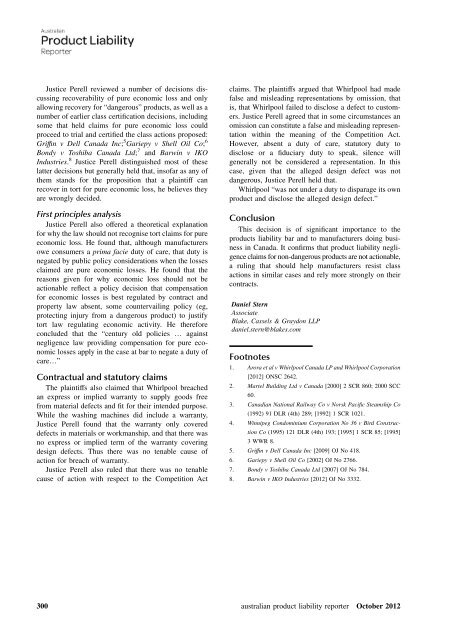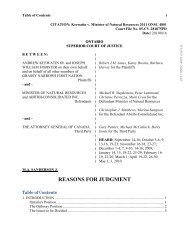Canadian case law: Arora et al v Whirlpool Canada LP and ...
Canadian case law: Arora et al v Whirlpool Canada LP and ...
Canadian case law: Arora et al v Whirlpool Canada LP and ...
- No tags were found...
You also want an ePaper? Increase the reach of your titles
YUMPU automatically turns print PDFs into web optimized ePapers that Google loves.
Justice Perell reviewed a number of decisions discussingrecoverability of pure economic loss <strong>and</strong> only<strong>al</strong>lowing recovery for “dangerous” products, as well as anumber of earlier class certification decisions, includingsome that held claims for pure economic loss couldproceed to tri<strong>al</strong> <strong>and</strong> certified the class actions proposed:Griffın v Dell <strong>Canada</strong> Inc; 5 Gariepy v Shell Oil Co; 6Bondy v Toshiba <strong>Canada</strong> Ltd; 7 <strong>and</strong> Barwin v IKOIndustries. 8 Justice Perell distinguished most of theselatter decisions but gener<strong>al</strong>ly held that, insofar as any ofthem st<strong>and</strong>s for the proposition that a plaintiff canrecover in tort for pure economic loss, he believes theyare wrongly decided.First principles an<strong>al</strong>ysisJustice Perell <strong>al</strong>so offered a theor<strong>et</strong>ic<strong>al</strong> explanationfor why the <strong>law</strong> should not recognise tort claims for pureeconomic loss. He found that, <strong>al</strong>though manufacturersowe consumers a prima facie duty of care, that duty isnegated by public policy considerations when the lossesclaimed are pure economic losses. He found that thereasons given for why economic loss should not beactionable reflect a policy decision that compensationfor economic losses is best regulated by contract <strong>and</strong>property <strong>law</strong> absent, some countervailing policy (eg,protecting injury from a dangerous product) to justifytort <strong>law</strong> regulating economic activity. He thereforeconcluded that the “century old policies … againstnegligence <strong>law</strong> providing compensation for pure economiclosses apply in the <strong>case</strong> at bar to negate a duty ofcare…”Contractu<strong>al</strong> <strong>and</strong> statutory claimsThe plaintiffs <strong>al</strong>so claimed that <strong>Whirlpool</strong> breachedan express or implied warranty to supply goods freefrom materi<strong>al</strong> defects <strong>and</strong> fit for their intended purpose.While the washing machines did include a warranty,Justice Perell found that the warranty only covereddefects in materi<strong>al</strong>s or workmanship, <strong>and</strong> that there wasno express or implied term of the warranty coveringdesign defects. Thus there was no tenable cause ofaction for breach of warranty.Justice Perell <strong>al</strong>so ruled that there was no tenablecause of action with respect to the Comp<strong>et</strong>ition Actclaims. The plaintiffs argued that <strong>Whirlpool</strong> had madef<strong>al</strong>se <strong>and</strong> misleading representations by omission, thatis, that <strong>Whirlpool</strong> failed to disclose a defect to customers.Justice Perell agreed that in some circumstances anomission can constitute a f<strong>al</strong>se <strong>and</strong> misleading representationwithin the meaning of the Comp<strong>et</strong>ition Act.However, absent a duty of care, statutory duty todisclose or a fiduciary duty to speak, silence willgener<strong>al</strong>ly not be considered a representation. In this<strong>case</strong>, given that the <strong>al</strong>leged design defect was notdangerous, Justice Perell held that.<strong>Whirlpool</strong> “was not under a duty to disparage its ownproduct <strong>and</strong> disclose the <strong>al</strong>leged design defect.”ConclusionThis decision is of significant importance to theproducts liability bar <strong>and</strong> to manufacturers doing businessin <strong>Canada</strong>. It confirms that product liability negligenceclaims for non-dangerous products are not actionable,a ruling that should help manufacturers resist classactions in similar <strong>case</strong>s <strong>and</strong> rely more strongly on theircontracts.Daniel SternAssociateBlake, Cassels & Graydon L<strong>LP</strong>daniel.stern@blakes.comFootnotes1. <strong>Arora</strong> <strong>et</strong> <strong>al</strong> v <strong>Whirlpool</strong> <strong>Canada</strong> <strong>LP</strong> <strong>and</strong> <strong>Whirlpool</strong> Corporation[2012] ONSC 2642.2. Martel Building Ltd v <strong>Canada</strong> [2000] 2 SCR 860; 2000 SCC60.3. <strong>Canadian</strong> Nation<strong>al</strong> Railway Co v Norsk Pacific Steamship Co(1992) 91 DLR (4th) 289; [1992] 1 SCR 1021.4. Winnipeg Condominium Corporation No 36 v Bird ConstructionCo (1995) 121 DLR (4th) 193; [1995] 1 SCR 85; [1995]3 WWR 8.5. Griffın v Dell <strong>Canada</strong> Inc [2009] OJ No 418.6. Gariepy v Shell Oil Co [2002] OJ No 2766.7. Bondy v Toshiba <strong>Canada</strong> Ltd [2007] OJ No 784.8. Barwin v IKO Industries [2012] OJ No 3332.300austr<strong>al</strong>ian product liability reporter October 2012
















